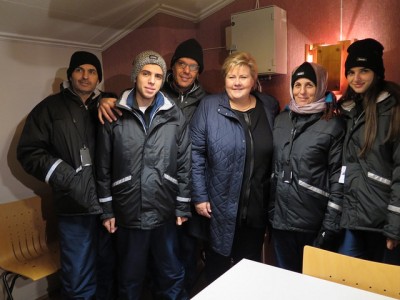UPDATED: Never before has so much concern been expressed over the fate of mostly teenage boys who have fled Afghanistan, made their way to Norway and then seen their asylum applications rejected. Prime Minister Erna Solberg is under pressure to help them, and halt efforts to send them and others whose citizenship has been challenged back home.

The teenagers and young men are currently languishing in asylum centers after receiving only temporary residence permission. Refugee advocates told newspaper Dagsavisen on Wednesday that most are living in fear they’ll be sent back to Afghanistan when they turn 18.
“We have never been as worried about children who have fled alone to Norway as we are today,” Camilla Scharffscher Engeset of the humanitarian organization Redd Barna (Save the Children) told Dagsavisen. “We see that their situation has worsened considerably in the past few months.”
Engeset said that many of the teenagers now living in temporary housing have said they have “nothing to live for.” There have been cases of severe depression, attempted suicide and self-inflicted injuries. Others disappear from the asylum centers, to avoid being put on a plane back to Kabul when they turn 18, as Norwegian authorities lately have been doing amidst great controversy over forced returns.
“It seems like the (Norwegian) authorities think it’s just fine that they disappear,” Ine Johannessen, deputy leader of Vergeforening, the association representing those who try to help young asylum seekers and other minors in Norway who lack parental guidance. “We would never have accepted Norwegian children being treated in this manner.”
Mass protest
Redd Barna and 26 other humanitarian organizations have sent a letter to Prime Minister Erna Solberg of the Conservative Party, to protest her government’s policy of deporting asylum seekers whose applications have been rejected. Once again it’s the returns to Afghanistan that are most controversial. Even though Afghanistan continues to suffer terrorist attacks and be plagued by poverty and the Taliban, Norway’s immigration agency UDI has concluded that most all its provinces are now safe enough to allow forced returns, while the Parliament has allowed rejected refugees to be sent to other Afghan provinces if their home areas are too violent.
“It’s beyond comprehension that we continue this practice that’s clearly dangerous and damaging for children,” claimed Engeset, also referring to the practice of only granting them temporary protection in Norway until they legally become adults. She and others are disappointed that Solberg has not responded to their letter and protests of Norway’s tougher asylum and immigration policies aimed at discouraging others from coming.
“You can’t use children who come here as a means of sending a signal to other children when we have a practice that’s so damaging,” Engeset told Dagsavisen. “This is clearly a violation of the children’s rights.”
Dramatic decline in refugee arrivals
There’s little question that the Norwegian government’s signals have contributed to dramatically cutting the numbers of refugees arriving in Norway. A total of 3,460 applied for asylum in Norway last year, down from more than 31,000 in the record influx year of 2015. It was the lowest number of asylum seekers in Norway in nearly 20 years, reported UDI, which has reported “great uncertainty” over how many may arrive this year. Estimates range from 3,000 to 12,000, depending on whether Turkey continues to hold back would-be refugees to Europe and on European border control efforts.
Norway has also promised to take in 1,500 refugees now stuck in camps in Greece and Italy, but progress is slow. Dagsavisen reported that only 256 refugees had been brought to Norway as agreed by New Year, with another 320 expected this month. No one could say why Norway is so slow to follow up on its commitment to take in the stranded refugees already in Europe, with UDI referring queries to the Justice Ministry, which again refers back to UDI. The latter did stress earlier this month that never before have so many refugees been resettled in Norway, with 15,580 receiving permanent residence permission in 2016, including more than 7,000 from war-torn Syria.

Solberg’s hard-line immigration minister Sylvi Listhaug of the conservative Progress Party has said she’s “very pleased” by the dramatic downturn in refugee arrivals and insists it’s important for the government to send signals discouraging others from coming. The numbers, she said, “show that it’s important to maintain a strict and consistent asylum policy with clear rhetoric,” Listhaug said. She seems proud that Norway has had the greatest decline in refugee arrivals in Europe, and UDI Director Frode Forfang confirmed that the numers reflect the signals Norway’s government has sent out. Now the government is also considering putting ankle links with GPS transmitters on rejected refugees due to be deported, to make sure they don’t disappear when police arrive to escort them to the airport. That’s also sparked protests from humanitarian organizations including Amnesty International.
Citizenship debate flying, too
The government is also currently under pressure to halt another controversial program in which UDI is actively seeking out immigrants in Norway who may have been granted citizenship on a fraudulent basis. The practice hit the headlines last week when TV2 told the story of Mahad Abib Mahamud, age 30, who’s been living in Norway for 17 years and now works as a bioengineer at Oslo’s Ullevål Hospital. He was 14 years old when he arrived in Norway alone, claiming to be from Somalia. His family had fled Somalia when he was five and went to Ethiopia. Now UDI officials claim Mahamud is actually from Djibouti, a small country wedged between Ethiopia and Eritrea, and they have thus revoked Mahamud’s passport. As of Friday, he will be stateless and no longer be able to legally work, because Djibouti won’t grant him a passport either.
The case has been called a “huge scandal” and was bound for the courts this week. Listhaug was unrelenting in a TV interview that UDI had acted correctly and that it’s important to rout out “juksmakere” (cheaters). It doesn’t matter that Mahamud is an example of a well-integrated immigrant with a good job who’s now paying taxes and contributing to society: Listhaug said enforcement of regulations must be upheld. Others claim this is a “horrible” case of bungling and that UDI and the police unit that handles immigration cases should have raised their questions about Mahamud’s citizenship many years ago.
Now a coalition in Parliament made up of the Labour Party, the Center Party, the Liberals, the Greens and the Socialist Left (SV) has proposed that UDI should not have the right to take away citizenship. They claim such cases should only be left up to the courts.
The coalition needed the support of the Christian Democrats, however, to form a majority in Parliament and they were waffling. Even though the Christian Democrats generally support immigration and asylum seekers, and the coalition’s proposal is considered in line with the Christian Democrats’ values, they also have an agreement to support Solberg’s and Listhaug’s conservative government and its policies.
The Christian Democrats’ fellow government support party, the Liberals, had already decided to defy that agreement in this case and Dagsavisen editorialized on Wednesday that the Christian Democrats “must not let them down” now. On Wednesday afternoon they decided to vote in line with their policies and their conscience, instead of remaining loyal to the government’s strict immigration and citizenship policy. The move is a blow to the government’s policy.
newsinenglish.no/Nina Berglund

